His performance for Avon Old Farms led to his being named to the United States roster at the 1985 World Junior Championships, the first of a number of appearances for the US in international hockey. He returned to the World Juniors in 1986, scoring a goal and 4 assists in 7 games as the Americans won a bronze medal. Following his 84 point season for Avon in 1985-86, Leetch was selected by the New York Rangers in the 1986 NHL Entry Draft as the ninth overall pick in the first round.
Leetch played his only season of college hockey, scoring 9 goals and 47 points in 37 games for the Boston College Eagles in 1986-87, earning NCAA First Team All-American honors, was named both Hockey East Rookie of the Year and Player of the Year, was Hockey East Tournament MVP and was named a finalist for the Hobey Baker Award as the best college hockey player of the year.
During that season he played in his third consecutive World Juniors, where he was named to the tournament All-Star Team, and then after the conclusion of his college season, played for the United States again, only this time at the senior level World Championships, scoring 3 goals and 7 points as a 19 year old.
For the 1987-88 season, Leetch joined the United States National Team in preparation for the upcoming Olympics in Calgary, Alberta. During the Games, he scored a goal and 5 assists for 6 points in 6 games.
After the conclusion of the Olympics, Leetch made his NHL debut, playing in the remaining 17 games on the Rangers schedule in the spring of 1988, scoring 14 points.
The following season he became a full time NHL professional, seeing action in 68 games, making his presence known around the league by setting a rookie defenseman scoring record with 23 goals on his way to averaging more than a point per game with 71 (good for second in team scoring), all of which earned him the Calder Trophy as the NHL Rookie of the Year. After the conclusion of the season, Leetch appeared in his second and final World Championships for the US, scoring 7 points in 10 games, with 3 of those being goals.
He would play in his first of ten NHL All-Star Game in 1990 and then raised his personal best to a team leading 88 points in 1990-91 with 16 goals and 72 assists, five points better than forward Bernie Nicholls. That fall, Leetch would once again suit up for the United States, this time during the 1991 Canada Cup tournament.
Leetch then set a career high in 1991-92 with 102 points from 22 goals and 80 assists, good for second on the Rangers, just five behind new arrival Mark Messier. His 100 point season was the first by an American defenseman and also the last 100 point season by a defenseman. His outstanding season was recognized when he was named the winner of the Norris Trophy as the league's Best Defenseman.
He was named an assistant captain for New York for the 1992-93 season, but was limited to just 36 games that season.
For the 1993-94 season, he returned to full health and played in all 84 of the Rangers games, which included equaling his career high with 23 goals on his way to 79 points. In the playoffs, the Rangers swept the New York Islanders in four, eliminated the Washington Capitals in five, outlasted the New Jersey Devils in a dramatic seven game series, which included three double overtime games. In Game 7, the Devils scored with just 7.7 seconds left to send the game to overtime before Stephane Matteau scored a memorable series winning goal after 84 minutes of play to send the Rangers to the Stanley Cup Finals.
The Rangers opponent was the Vancouver Canucks, who won Game 1 in overtime in New York. The Rangers then won the next three games, including two wins on the road in Vancouver. The Canucks rallied with a Game 5 win in New York and forced a Game 7 with a win back at home. Leetch opened the scoring at 11:02 of the first period followed by a goal from Adam Graves for a 2-0 New York lead after one. The teams traded goals in the second period and the Rangers held on for the final 15:10 after Trevor Linden's second goal for the Canucks made it 3-2.
The championship for New York was their first Stanley Cup since 1940, a span of 54 years. Leetch was named the winner of the Conn Smythe Trophy as the playoff MVP, thanks to his defensive skills as well as being the playoff's leading scorer with 11 goals and 34 points in 23 games.
With the NHL season shortened in 1994-95 by a labor dispute, Leetch was limited to 48 games, during which he scored 41 points. He averaged more than a point per game in 1995-96 with 85 points while playing in all 82 of the Rangers games.
Leetch was named as the captain of the United States team for the inaugural World Cup of Hockey in the fall of 1996. The US made their intentions clear during their opening game, a 5-3 win over Canada. They then defeated Russia 5-2 on familiar ice in New York and won the North American Pool with a 9-3 thumping of Slovakia to earn a bye into the Semifinals, where they again defeated Russia by the same 5-2 score to advance to a best of three final against Canada.
Game 1 in Philadelphia went to Canada 4-3 in overtime before the Americans fought back with a 5-2 win in Montreal to even the series followed by another 5-2, again in Montreal, to capture the first World Cup and the United States most significant victory since 1980. Leetch was fourth on the team and sixth in tournament scoring with 7 assists in 7 games played.
The 1996-97 season saw Leetch score 78 points for the Rangers on his way to a second Norris Trophy after finishing the season a +31. The 1997-98 season saw Leetch named the Rangers team captain, a position he would hold for three seasons. During that season, the NHL would take the first break from its schedule to allow its players to participate in the Olympics, Leetch's second Games. As an assistant captain for the US, he would score a goal and 2 points in 4 games.
Leetch would play six more seasons for New York, highlighted by a 21 goal, 79 point season in 2000-01, the season during which he also played in the 1,000th game of his career. Also during this time period, he would play in his third Olympics in 2002, earning a silver medal, again as an assistant captain, while contributing 5 assists in 6 games.
With the Rangers having missed the playoffs for the previous six seasons and on their way to a 13th place finish in the Eastern Conference out of 15 teams in 2003-04, they began rebuilding by trading away veteran players, which saw Leetch dealt to the Toronto Maple Leafs for two prospects and a first and second round draft picks.
He would eventually play just 15 games for Toronto plus 13 playoff games. In the fall of that year, Leetch played for the final time for the United States in the 2004 World Cup of Hockey. It would be his last hockey for a calendar year, as the upcoming season of 2004-05 was cancelled due to labor issues.
For the 2005-06 season, Leetch, now a free agent, signed with the Boston Bruins, for what proved to be the final season of his career. He played in 61 games that season, which included 5 goals and 27 assists for 32 points, which included the 1,000th point of his career on October 18, 2005.
His final totals were 1,205 games played, 247 goals and 781 assists fr 1,028 points. He won a Stanley Cup in 1994, the 1989 Calder Trophy, the Norris Trophy in 1992 and 1997, the 1994 Conn Smythe Trophy and played in ten NHL All-Star Games.
Internationally, he won a bronze medal at the 1986 World Juniors, a silver medal at the 2002 Olympics and the 1996 World Cup as team captain.
His jersey #2 retired by New York on February 24, 2008 and he was inducted into the United States Hockey Hall of Fame in 2008 and the Hockey Hall of Fame in 2009.
Today's featured jersey is a 1991-92 New York Rangers Brian Leetch jersey from his 102 point season, the first 100 point season ever by an American defenseman and the season he won his first Norris Trophy.
The Rangers have worn blue jerseys with RANGERS diagonally across the front of their jerseys since their inaugural season of 1926-27 with very few exceptions. They wore modernized jerseys with their shield crest for two seasons in the latter half of the 1970s and when the returned to their classic jersey styles for home and road, they wore NEW YORK on the front of the blue road jerseys from 1978-79 to 1986-87.
They reverted to having RANGERS on the front of their blue jerseys again for Leetch's rookie season of 1987-88 with the names straight across the back. The names became the classy vertically arched letters in 1990-91 and only a change to a lace up collar and a change to the waist striping in 1997-98 happening during his lengthy New York career.
Bonus jersey: Today's bonus jersey is a 2001-02 New York Rangers Brian Leetch jersey worn only on October 7, 2001 against the Buffalo Sabres, who also wore special jerseys crested with "New York" diagonally across the front in the Rangers first home game following the terrorist attacks on September 11, 2001 in New York.
The jerseys were then auctioned off to raise money for the Twin Towers Fund, with the jerseys of Leetch and goaltender Mike Richter raising $15,010, second only to team captain Messier's $20,010.
Extra bonus jersey: Today's extra bonus jersey is a 2003-04 New York Rangers Brian Leetch jersey. This highly attractive alternate jersey was worn by the Rangers from 1996-97 to 1997-98 and again from 1999-00 to 2006-07. The Rangers made a white version of this "Liberty" jersey, which replaced the navy blue version for only the 1998-99 season until bringing back the navy version for its second seven season run, which only came to an end when Reebok introduced their Edge jerseys in 2007-08 and all third jerseys were eliminated for that season.
Extra extra bonus jersey: Today's extra extra bonus jersey is a 1996 United States National Team Brian Leetch jersey as worn by the American captain.
Retail versions of his highly collectable style were sold only in the home white style in numbered sizes, such as 48 and 52, with sewn on USA cresting and customized with Leetch, Richter and Jeremy Roenick, who actually did not participate in the 1996 World Cup due to being between NHL contracts at the time and therefore not having insurance in case of a major injury, and did not have the World Cup tournament logo patch.
In addition to the retail jerseys not being sold with the World Cup patch, the Leetch jerseys did not come with the captain's "C" either. Both would need to be added separately for proper authenticity as is the case with today's extra extra bonus jersey.
Also of note, some uncustomized white jerseys were produced for retail sale and can be recognized by their letter sizing, such as L and XL, and sublimated USA cresting as opposed to the customized jerseys, which had sewn on twill logos and numbered sizing.
Blue road jerseys are even more scarce, having only been produced for use by the United States national teams in 1996 and 1997, and since they were intended to be worn by players, come in larger sizes such as 54, 56 and 60.
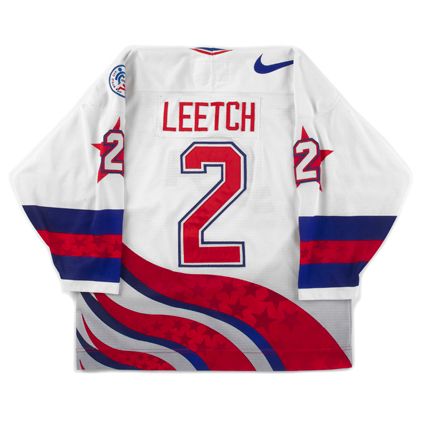

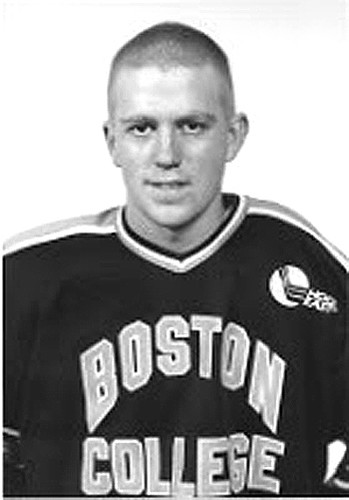
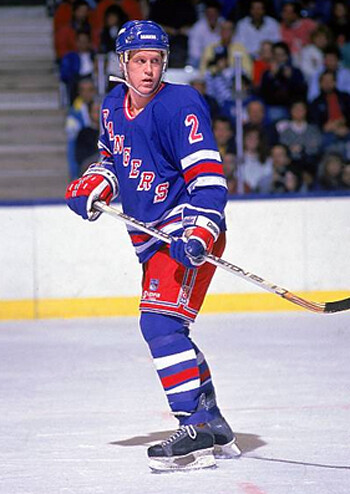
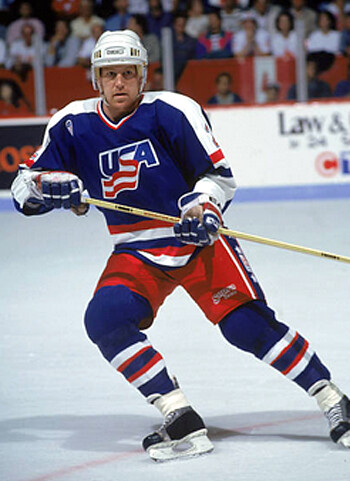
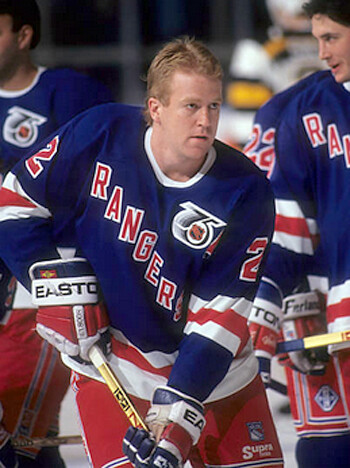
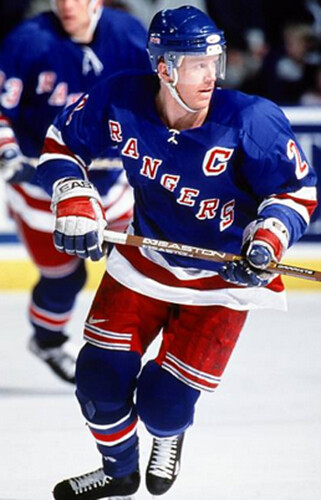
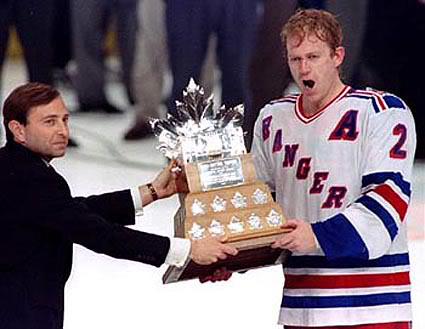
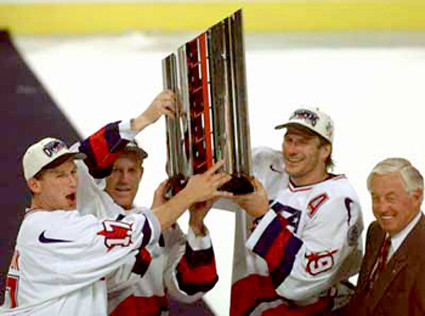
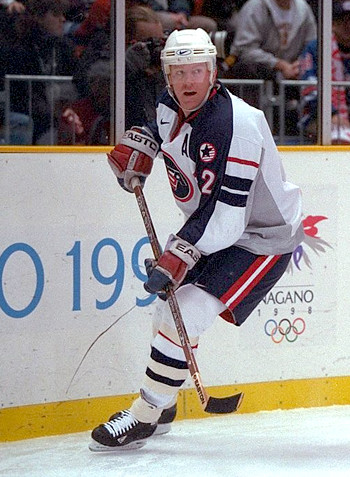
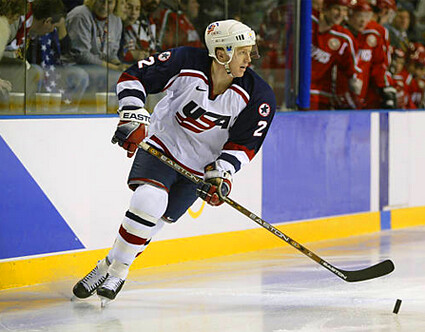
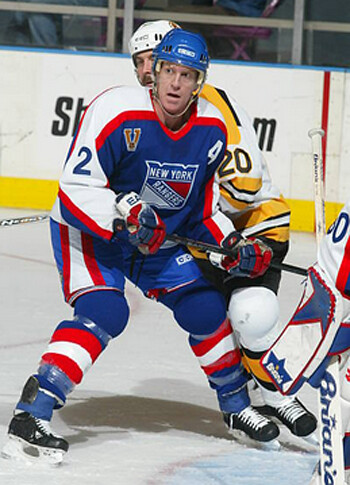
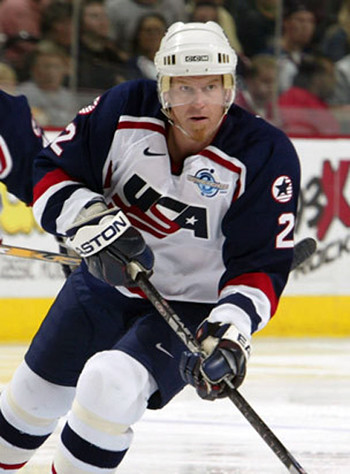
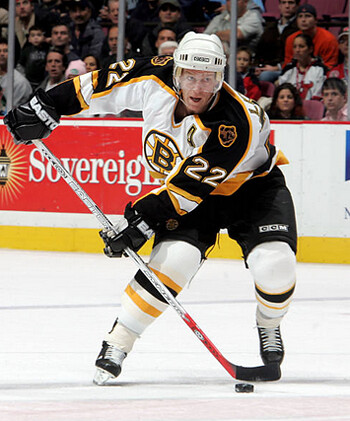
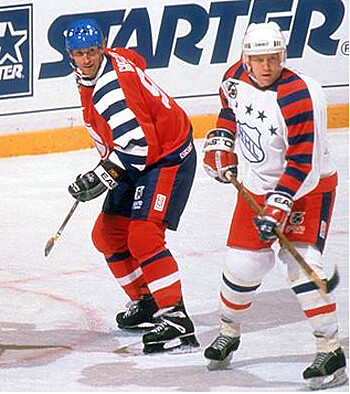
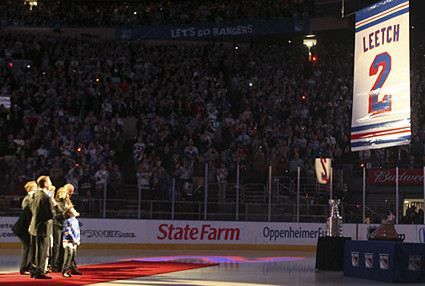
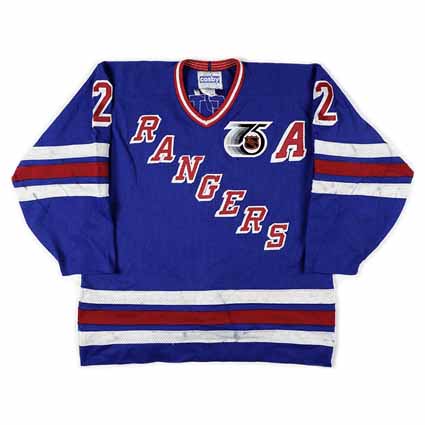
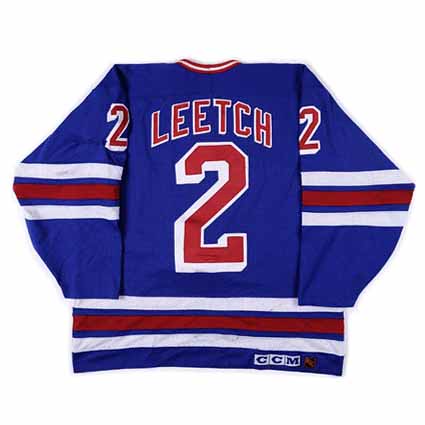
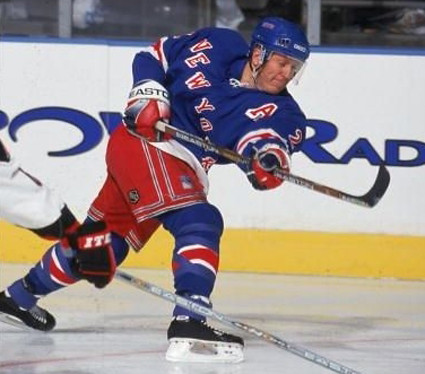
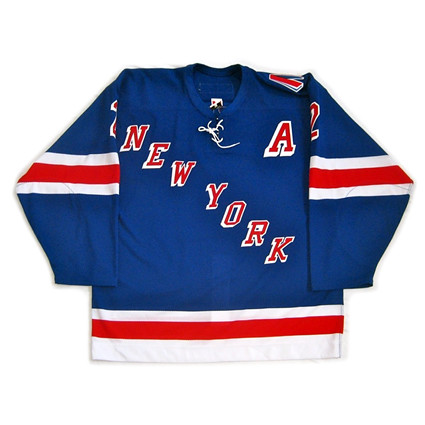
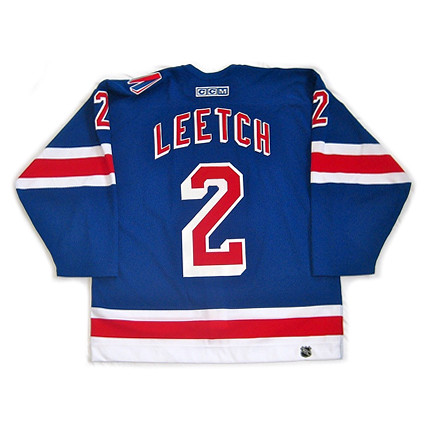
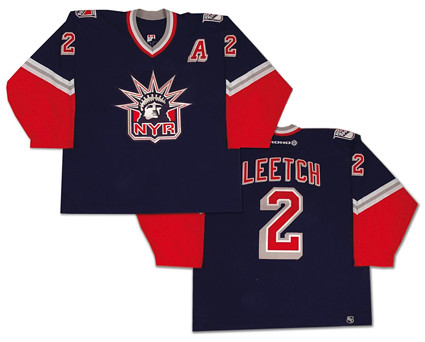
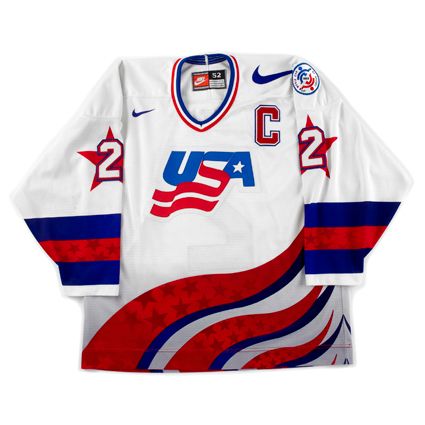










No comments:
Post a Comment
We welcome and encourage genuine comments and corrections from our readers. Please no spam. It will not be approved and never seen.